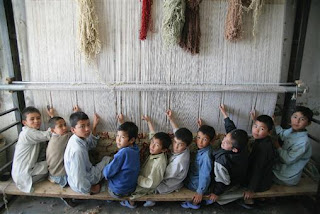Boys work in a carpet factory in Quetta City, Balochistan. UNICEF currently estimates that 150 million children between the ages of five and 14 are engaged in labour of some sort. Although child labour is in decline globally, the economic crisis has forced many children into work earlier and in more hazardous roles.
(ES)
The transformation of a raw material into a finished product requires natural resources, economic, technological and human.
Natural, economical and technological resources are private property in the hands of employers, while human resources are only owners of the labour force that gives them a salary and generates surplus value to the capitalist.
Free market and competition make that employers seek ways of producing their manufactures, with the means of production they own and the labour force they hire, at the lowest possible cost. For what they delocalize their production to countries with labor laws, environmental, commercial and tax less strict than in Europe and USA.
As a corollary to this, the transformation of raw materials into a finished product not only meets the needs of consumers but also transforms the feelings and lives of all those involved in the commodity chain.
In the consumerist society we live in, marketing has managed to create us fictitious needs and to associate happiness to consume. So, how do you transform a raw material in happiness? What is the price we have to pay, measured in feelings, for our consumerist "happiness" in the miscalled first world?
The solitude of a trafficked minor, away from his or her family, who grows cotton in Benin. The fear of being beaten by the landlord if fails to comply with their strenuous work. The frustration at not being able to attend school. The despair of a human being become beast. The pain of children's muscles fatigued by the hard work.
The fatigue of a Turkish worker who works twelve hours a day with a compressor that shoots a jet of sand and water on the denim from India, Pakistan or Bangladesh, dyed by children exposed to high-polluting chemicals. Silica in the lungs and lead in the skin.
The miner dehumanized, turned himself into stone, which extracts the cassiterite from the mines at the east of DR Congo. Exhausted, brutalized by a system in which prevails the survival of the fittest, his life is worth nothing to the militias that control the territory. Forced to work for nothing, enslaved, disheartened. Far from home, fleeing a forgotten conflict, he and his family dies every day from starvation, misery and fatigue.
To enjoy a stonewashed jean or the latest smart phone model have to pay a high price in suffering, because corporate greed knows no bounds, and has appropriated the only thing that did not belong so far, has seized life and labour force of millions of people living in abject poverty, lacking opportunities, and barely surviving on the product of their effort.
How long before also capital seizes our lives by cutting fundamental rights?
Discover that happiness is not what you have but what you give to others is the key to return stolen happiness to the millions of people who, through their suffering, transform our lives in a delusion of well-being. Would not be fair to reimburse them for so much misery that they have been condemned by all of us because of our sad desire to possess material things?
Ethical consumerism will break the chain of poverty and it will contribute to a more socially fair and egalitarian world.
.






No comments:
Post a Comment